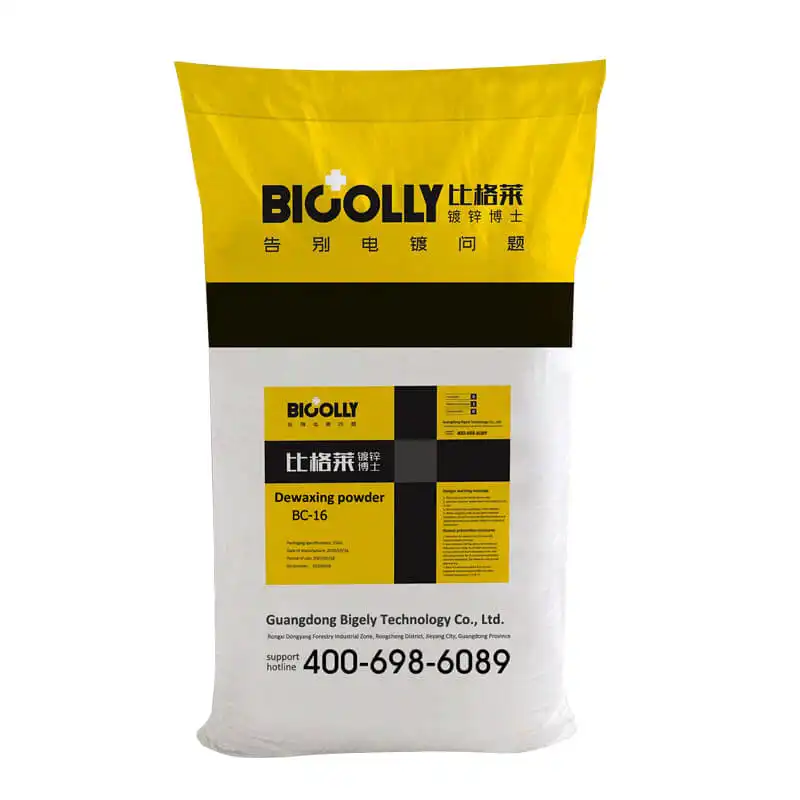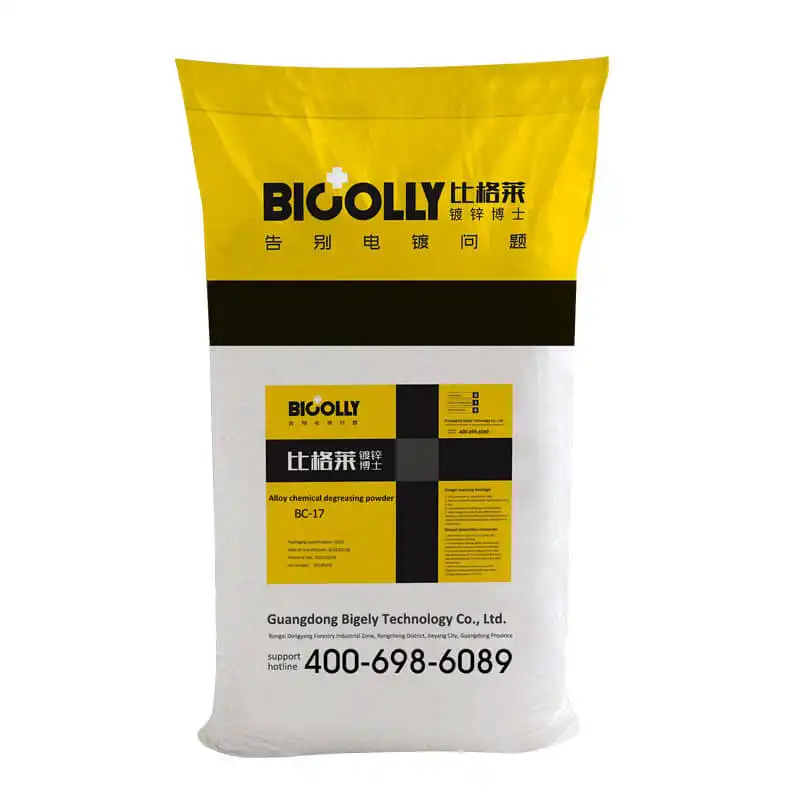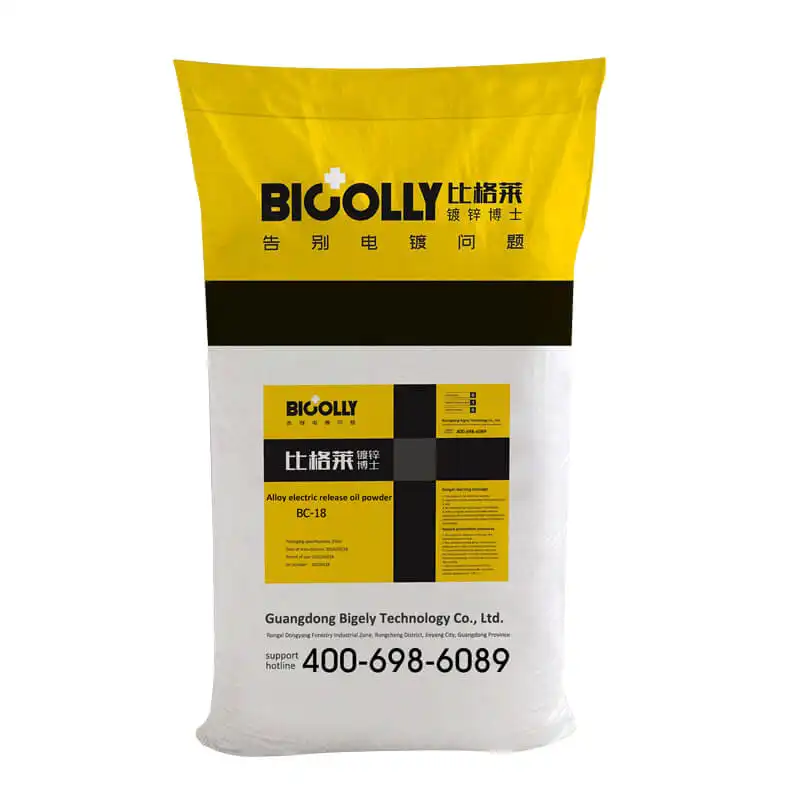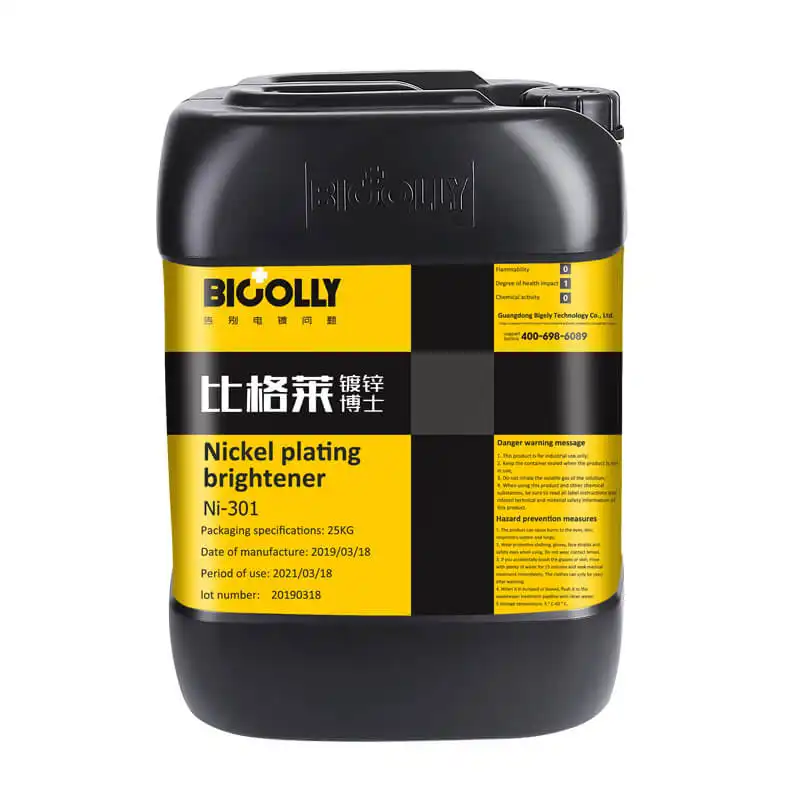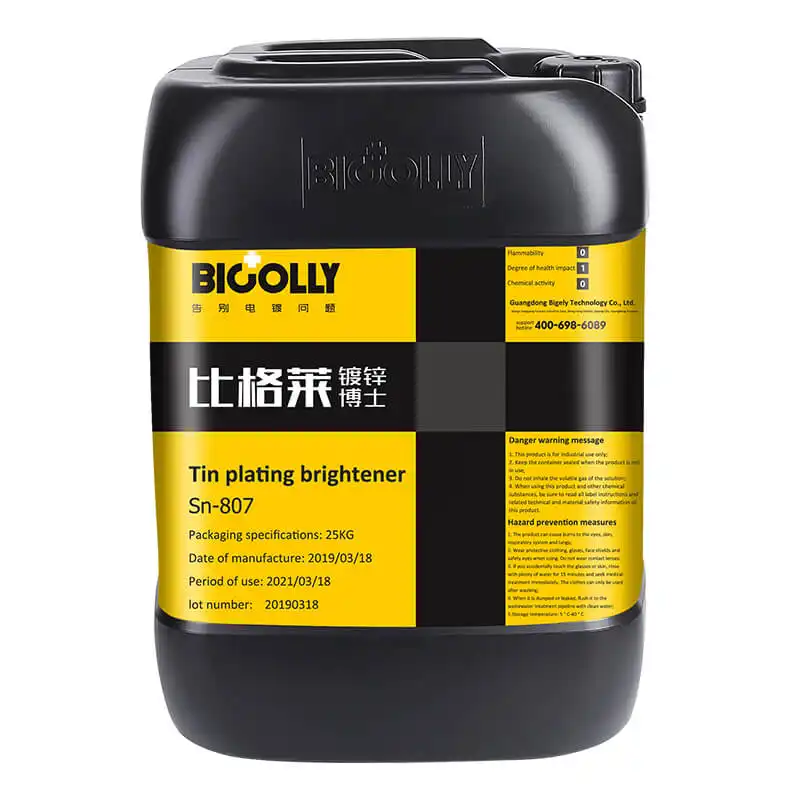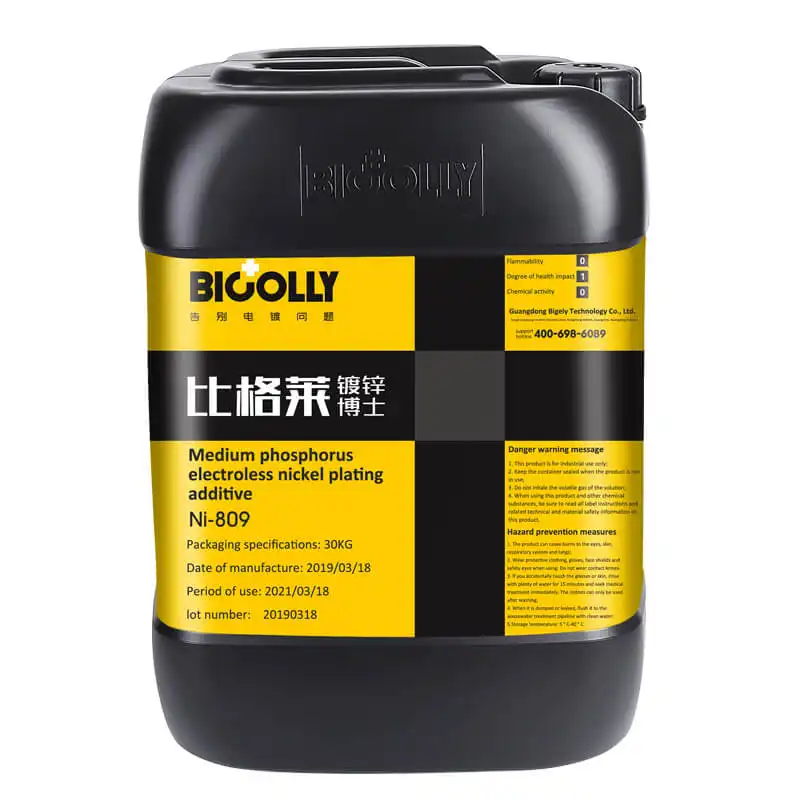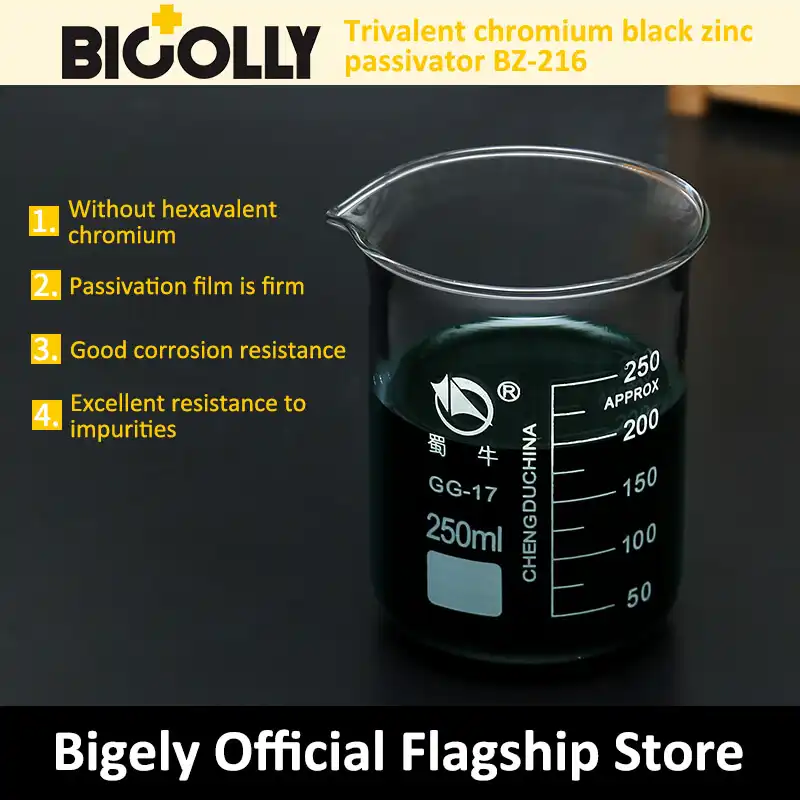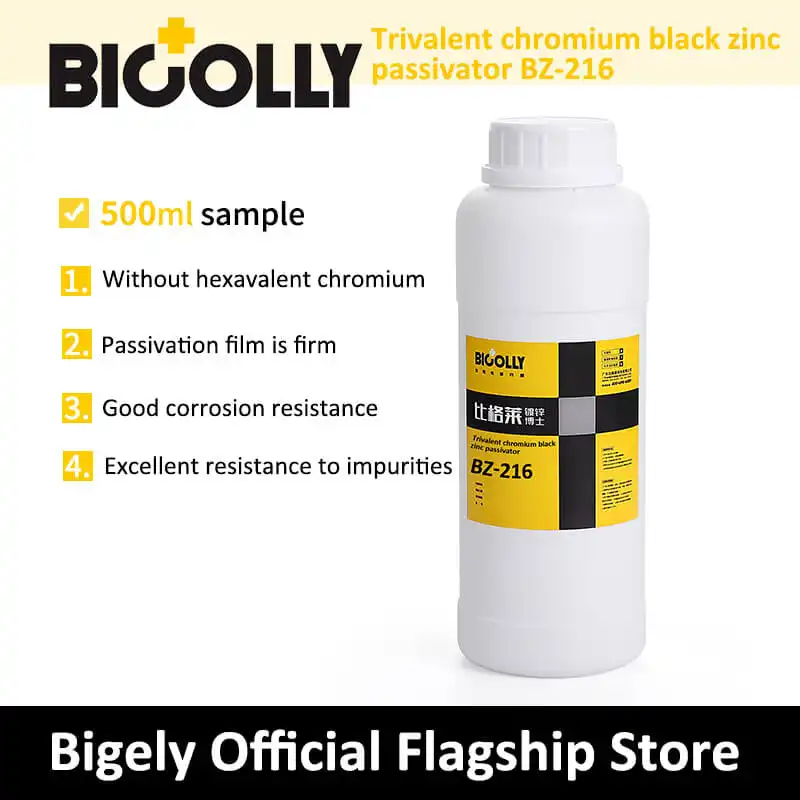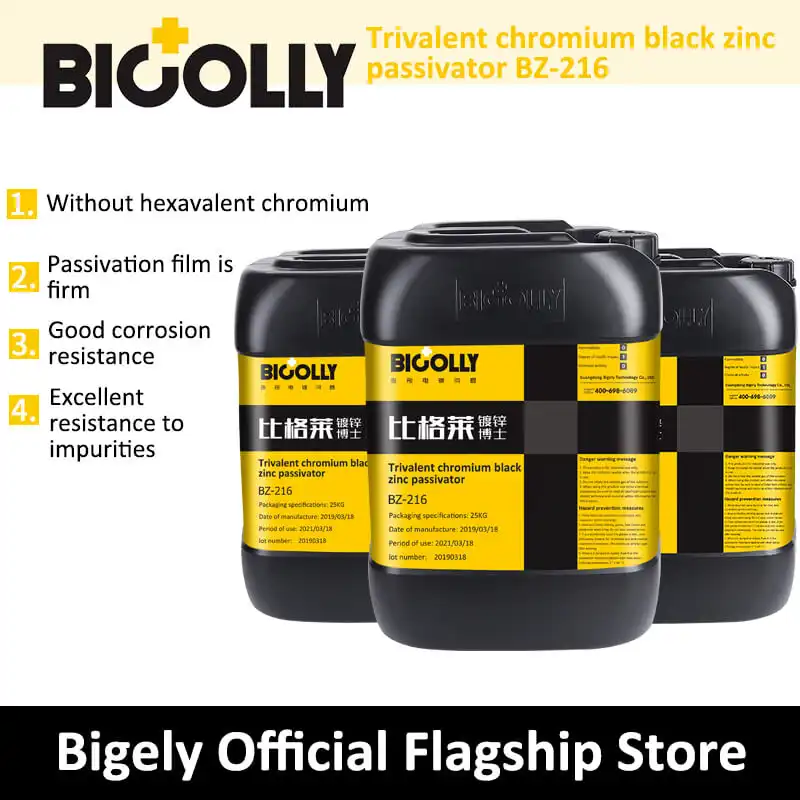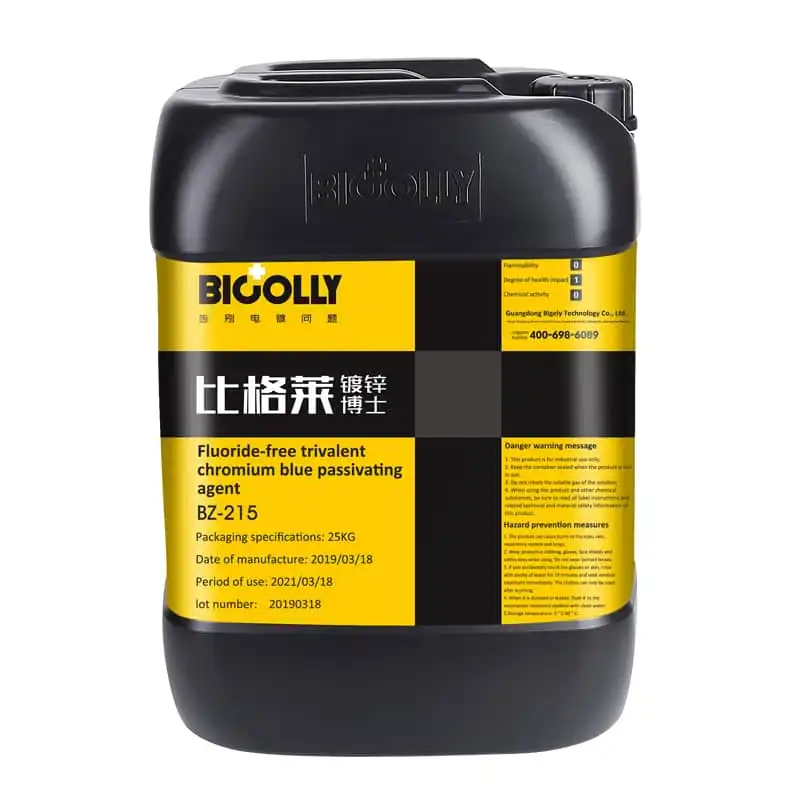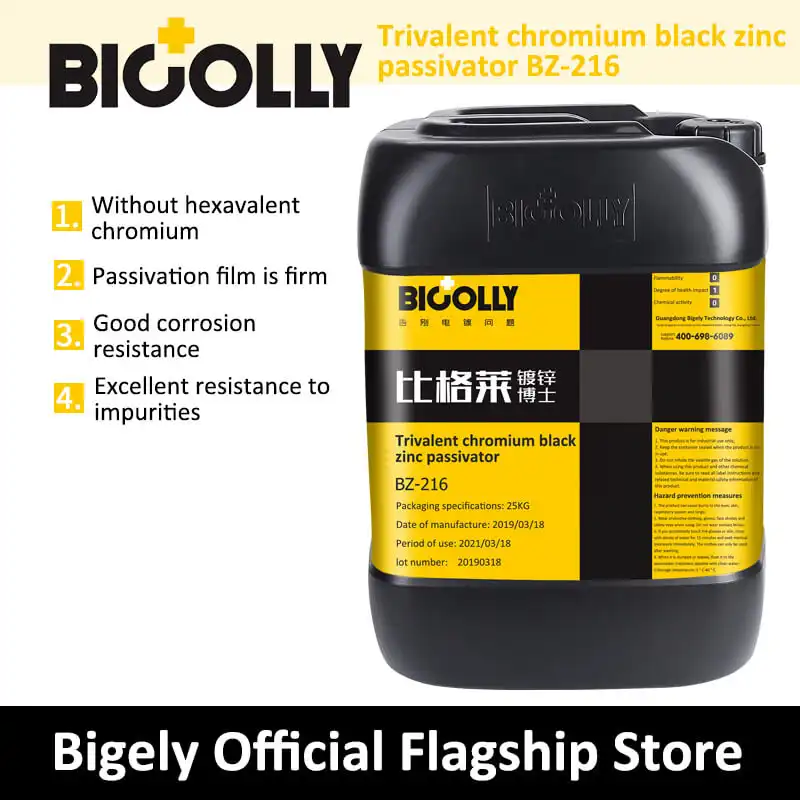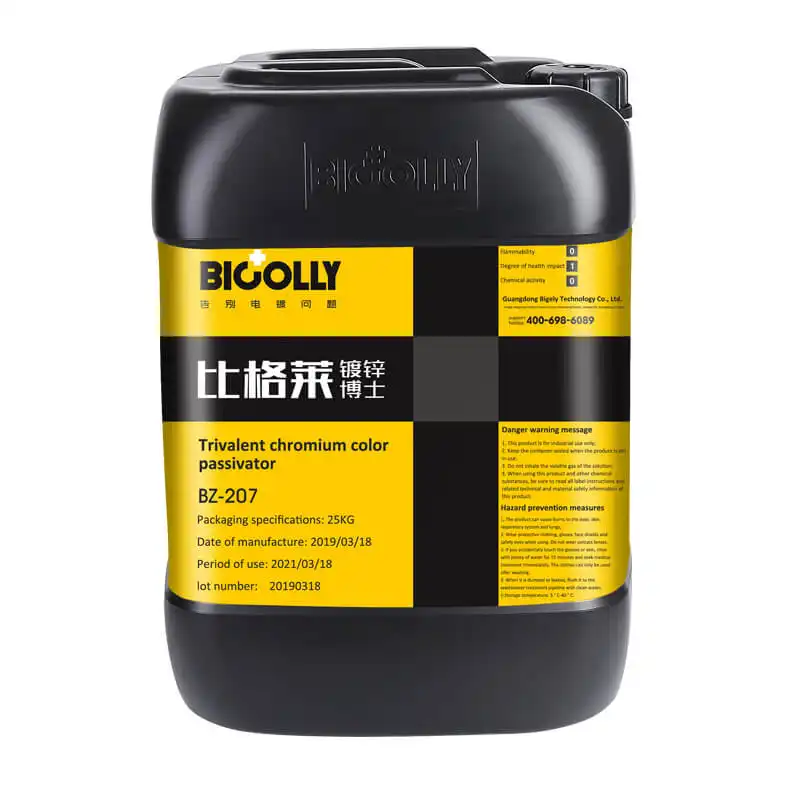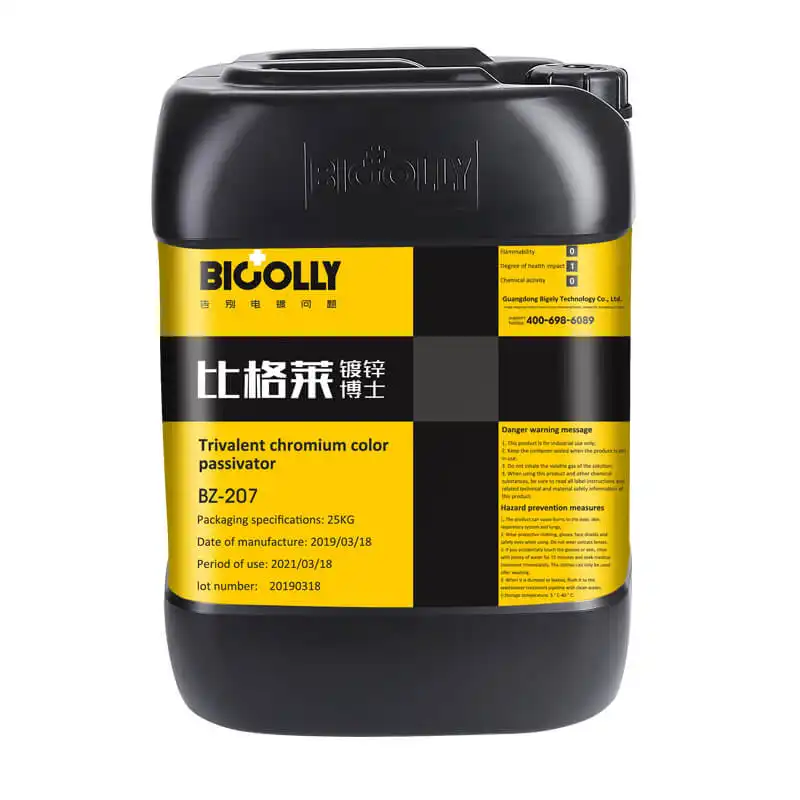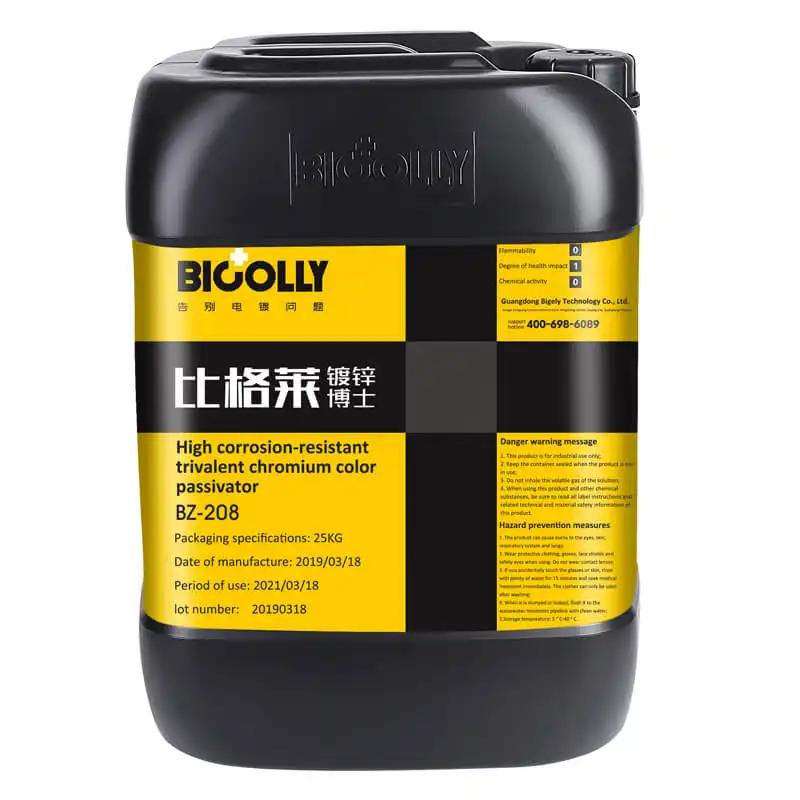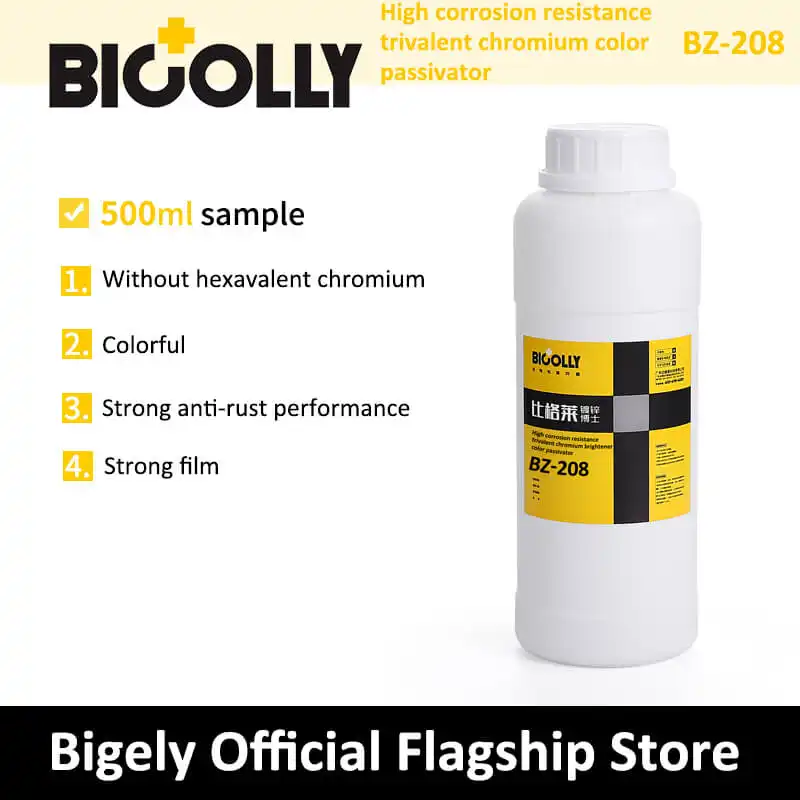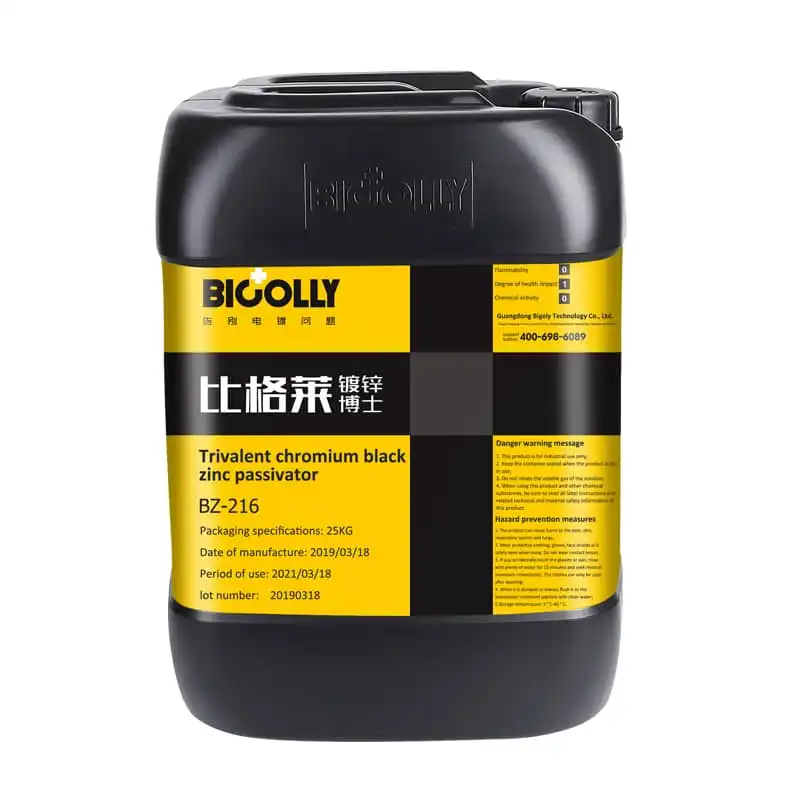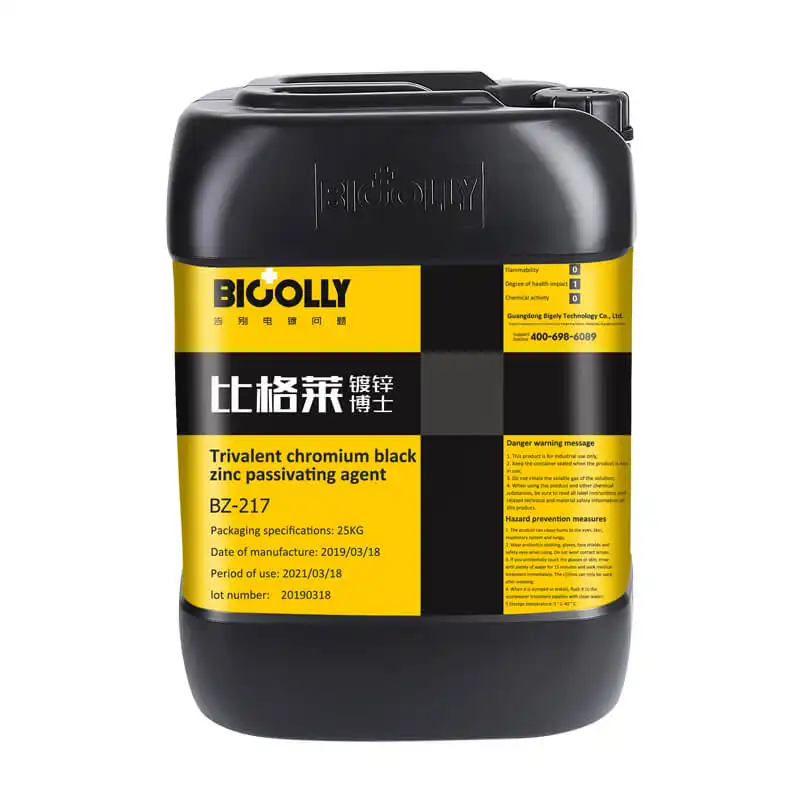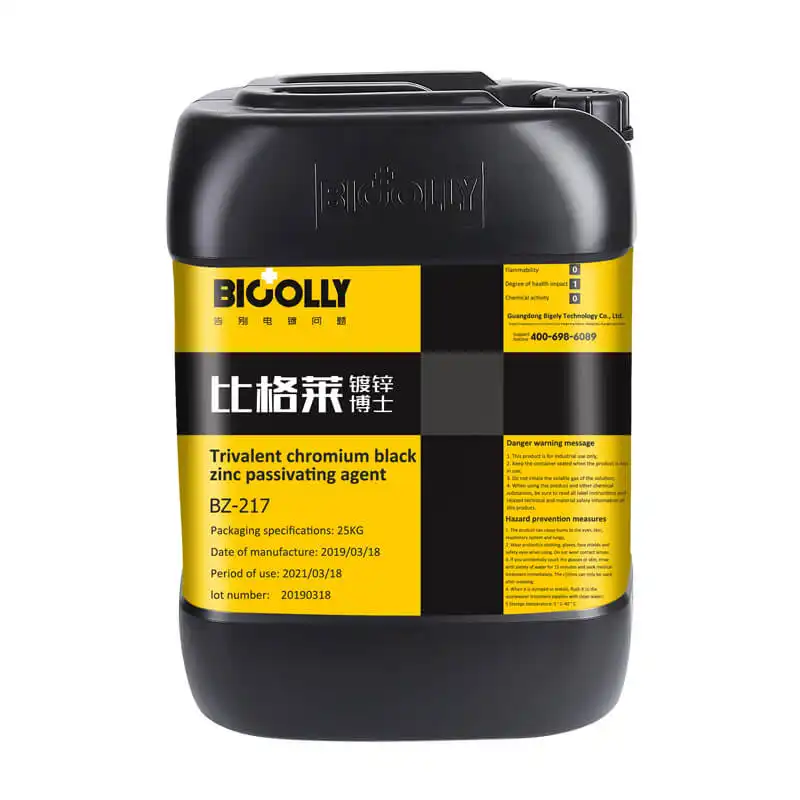Trivalent chromium black zinc water
Zn-116 trivalent chromium black zinc water
contains no hexavalent chromium black passivation agent, suitable for plating and barrel plating.
and sealants are used together, can produce the dense black on alkaline zinc plating passivation layer.
use with sealants, 5% salt fog test white rust resistance ≧ 72 hours. A finish coat is needed for a dark black and shiny appearance.
impurity excellent performance. Plating solution has long service life. Easy to operate and maintain.
in barrel plating or automatic line passivation, collision or friction scratches will automatically repair.
Operating conditions
|
Passivation operating conditions |
best value |
range |
|
Zn-116 trivalent chromium black zinc water |
100 mL / L |
80-150 ml / liter |
|
PH |
2.2 |
1.8-2.4 |
|
time |
45 seconds |
30-60 seconds |
|
temperature |
30 ℃ |
25-35 ℃ |
|
|
||
|
Closed operating conditions |
best value |
range |
|
Sealant 76 |
Rack plating: 100 mL / liter Barrel: 150 mL / L |
Rack plating: 50-150 ml / liter Barrel: 50-250 ml / liter |
|
Sealant 77 |
5mL / L |
0-10 ml / liter |
|
PH |
4.0 |
3.8-5.5 |
|
time |
10 seconds |
5-20 seconds |
|
temperature |
40 ℃ |
30-50 ℃ |
|
Stir |
Gentle stirring |
|
|
|
||
|
Topcoat operating conditions |
best value |
range |
|
BH-1209 |
20% |
10-30% |
|
PH |
9.5 |
9.0-11.0 |
|
time |
30 seconds |
20-40 seconds |
|
temperature |
30 ℃ |
25-35 ℃ |
|
Stir |
Gentle stirring |
|
equipment
Plating cylinder: stainless steel plastic coated with heat resistance properties.
Stirring: In hanging plating, it is recommended to use partial stirring or plating solution stirring to ensure uniform passivation effect.
PVC or polypropylene coils are recommended.
Open cylinder configuration
Fill the cylinder with the required amount of water and add Zn-116 trivalent chromium black zinc water.
Let stand for 15 minutes and continue to stir until the additive reacts.
Adjust pH to 1.8-2.2 with 10% sodium hydroxide. If you need to reduce the pH, use 50% nitric acid.
Process flow
Galvanizing → washing → washing → activation → washing → washing → black passivation (Zn-116 trivalent chromium black zinc water) → washing → washing → sealing (sealant 76) → drying (60-120℃) → top paint (BH-1209) → drying (60-120℃)
maintenance
The optimum state of the passivation solution can be maintained by regular supplement of Zn-116 trivalent chromium black zinc water.
Reduce pH by adjusting with dilute nitric acid. Raise pH by adjusting dilute sodium hydroxide solution.
The amount of additives added should be controlled by solution analysis prior to the establishment of a regular supplement schedule.
Supplementation can also be made based on the surface area of the work piece and as a reference. For every 100 SQM (10 SQFT) of passivation, approximately 20-25 ml of Zn-116 trivalent chromium black zinc water will be required, depending on strip loss.
Analysis and control
1. Draw 2 ml of Zn-116 trivalent chromium black zinc water plating solution and pour it into a 250 litre conical flask.
2. Add 50ml of pure water.
3. Adjust pH to about 10 (color to green, use 10-15 ml 10% sodium hydroxide)
4. Add 1.0-1.5ml of hydrogen peroxide
5. Boil the solution for 30-45 minutes until 1/3 of its volume remains. The excess hydrogen peroxide is completely evaporated.
6. After the solution cools, add 100 ml of pure water.
7. Add about 15ml of concentrated hydrochloric acid to change the color of the solution from yellow to orange. When the solution gets hot, it needs to be cooled again.
8. Add 4-5 ml 10% potassium iodide (dark red) and starch solution.
9, with 0.1N sodium thiosulfate solution titration until the solution becomes dark color disappear.
Calculation: Zn-116 trivalent chromium black zinc water concentration (ml/l)
= reading * constant of sodium thiosulfate *50
0.1
Wastewater treatment
Zn-116 trivalent chromium black zinc water passivation solution contains trivalent chromium compounds. Lime was used to adjust pH to 9.0 to remove precipitated heavy metals. Discharge only after the solution is clear.
Matters needing attention
Zn-116 trivalent chromium black zinc water and its operating liquid belong to acidic substances, and the operation should be careful. Nitric acid can cause serious burns to the skin and eyes. Wear protective clothing, goggles and a mask when handling. In case of contact, rinse immediately with plenty of water.
Fault handling
|
Failure phenomenon |
the reason |
Solution |
|
Passivation film is gray and black is not enough |
1. The galvanized layer is too thin |
1. Increase the thickness of the galvanized layer ( above 6 μ) |
|
2. a Zn-1 16 trivalent chromium and zinc concentration is too high water |
2. Analyze and adjust the concentration of Zn-116 trivalent chromium black zinc water |
|
|
3. PH of passivation solution is too high or too low |
3. Adjust the PH value of passivation liquid |
|
|
4. The temperature of the passivation liquid is too low |
4. Increase the temperature of the passivation liquid |
|
|
5. Passivation time is too short |
5. Properly extend the passivation time |
|
|
6. the passivation solution too much zinc, iron and impurities (<10000ppm ) |
6. Replace part of the passivation liquid |
|
|
7. The impregnation time of the sealing treatment is too long |
7. Shorten the impregnation time of the sealing treatment |
|
|
The surface of the black film is iridescent |
1. a Zn-1 16 trivalent chromium and zinc water PH low |
1. Adjust the PH of Zn-116 trivalent chromium black zinc water |
|
2. The operating concentration of the sealing solution is too low |
2. Increase the operating concentration of the sealing solution |
|
|
3. The operating temperature of the sealing liquid is too low |
3. Increase the operating temperature of the sealing liquid |
|
|
4. Uneven mixing of passivation solution |
4. Strengthen the stirring of passivation solution |
|
|
Poor film brightness |
1. a Zn-1 16 trivalent chromium and zinc concentration is too high water |
1. Analyze and adjust the concentration of Zn-116 trivalent chromium black zinc water |
|
2. The PH of the passivation solution is too low |
2. Adjust the PH value of passivation liquid |
|
|
3. The passivation liquid is stirred too intensely |
3. Adjust the stirring intensity of the passivation liquid |
|
|
4. The passivation time is too long |
4. Adjust the passivation time |
|
|
5. The temperature of the passivation liquid is too high |
5. Increase the temperature of passivation liquid |
|
|
6. The operating concentration of the sealing solution is too low |
6. Increase the operating concentration of the sealing solution |
|
|
7. The operating temperature of the sealing liquid is too low |
7. Increase the operating temperature of the sealing liquid |
|
|
8. The PH of the sealing liquid is too low |
8. Adjust the PH of the sealing liquid |
|
|
9. The drying temperature is too high |
9. Lower the drying temperature |
|
|
10. The brightness of the galvanized layer itself is poor |
10. Improve the brightness of the galvanized layer |
|
|
The black of the passivation film is uneven, and the edge part is not filmed |
1. Too much organic matter in the plating solution |
1. Plating bath activated carbon treatment |
|
2. Excessive electroplating current |
2. Adjust the plating current |
|
|
3. The galvanized layer is too thin |
3. Increase the thickness of the galvanized layer |
|
|
4. a Zn-1 16 trivalent chromium and zinc is too high water concentration |
4. Analyze and adjust the concentration of Zn-116 trivalent chromium black zinc water |
|
|
5. PH of passivation solution is too low (passivation dipping time is too long) |
5. Properly increase the PH of passivation solution |
|
|
6. When the barrel-plated parts are passivated, the flipping is too intense |
6. Adjust the flip frequency |
|
|
The color of the passivation film is slow, or the black film on the edge part is normal, and the middle part is not black |
1. The PH of the passivation solution is too high |
1. Adjust the PH of passivation liquid |
|
2. Low passivation liquid temperature |
2. Increase the temperature of passivation liquid |
|
|
3. No stirring or insufficient stirring strength |
3. Increase air stirring or strengthen stirring intensity |
|
|
4. The passivation time is too short |
4. Properly extend the passivation immersion time |
|
|
Passive film has poor corrosion resistance |
1. A Zn-1 16 trivalent chromium and zinc water concentration is too low |
1. Analyze and adjust the concentration of Zn-116 trivalent chromium black zinc water |
|
2. The temperature of passivation solution is too low |
2.Increase the processing temperature of passivation liquid |
|
|
3. The PH of the passivation solution is too low or too high |
3. Adjust the PH of passivation liquid |
|
|
4. The passivation solution processing time is too short |
4. Properly extend the passivation solution processing time |
|
|
5. The influence of zinc and iron ions in the passivation solution (zinc<10000ppm ) (iron<200ppm ) |
5. Replace part of the passivation liquid |
|
|
6. The operating concentration of the sealing solution is too low |
6. Increase the operating concentration of the sealing solution |
|
|
7. The operating temperature of the sealing liquid is too low |
7. Increase the operating temperature of the sealing liquid |
|
|
8. The PH of the sealing liquid is too low |
8. Adjust the PH of the sealing liquid |
|
|
9. Effect of iron impurities blocking agent (<200ppm ) |
9. Replace part of the sealing liquid |
|
|
10. The drying temperature after sealing is too low |
10. Increase the drying temperature |
FAQ
1. Q: Do you make the products yourself? Are you a trader or a manufacturer?
A: Yes, the products are produced by our company. Our company is a manufacturer focusing on the R&D and manufacturing of environmental protection electroplating additives. Our factory has 5000 square meters with an annual capacity of 15000 tons.
2. Q: Can your company send samples for trial?
A: We can provide samples for trial.
3. Q: What is the quality of your products?
A: Our company all products core raw materials is used by Germany BASF, American Dow Chemical and other international brand products. The production process is strictly in accordance with the ISO9001 quality management system, from the incoming inspection, product inspection, according to the strict inspection standard, ensure that every drop of products qualified. Product quality you can rest assured, like BYD, Huawei, Foxconn such enterprises are also using our products.
4. Q: How long is the shelf life of your products?
A: The shelf life of our products is two years. If you do not use up the products within a short time after you buy them, we suggest you store them in a cool place, not in the sun or in a high temperature environment.
5. Q: Are your products environmentally safe?
A: Our products have passed the SGS test and are recognized as "Green and Environment-friendly Promotion Products". Many auto parts and electronic products which use our products can pass the strict environmental protection test when they are exported to Europe and America. Therefore, we can be trusted in terms of environmental protection and safety.
6. Q: Can your company provide technical services?
A: Yes, our company has a technical service team of more than 10 people. The technical engineers all have more than 20 years' experience in electroplating factory. They can provide customers with comprehensive technical of pre-sales and after sales.
7. Q: Is it possible to visit your company?
A: Yes, of course. You are very welcome! We can meet you at Jieyang airport, If you can come to our city. Also you can visit our factory through live video.
8. Q: Can you customize products according to our needs?
A: Yes, our company has research and development strength, the product formula derived from Europe and the United States laboratory, European and American engineers technical support, work together with domestic universities. Our company has a member of Guangdong province expert enterprise workstation, Shantou university science and technology correspondent workstation, Jieyang city environmental protection engineering research center for electroplating additive.Therefore, it can meet all kinds of customized requirements proposed by customers.
 Products
Products